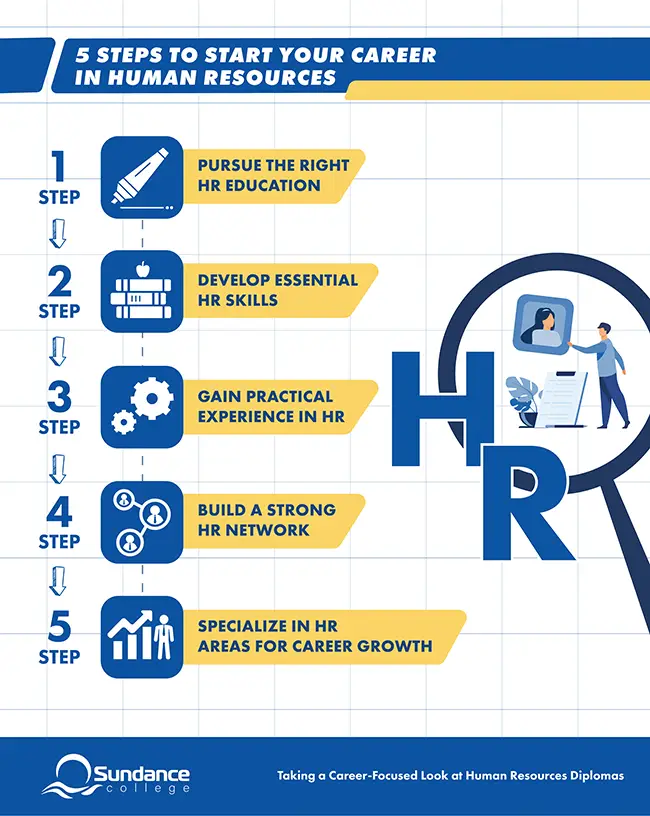Blog / Taking a Career-Focused Look at Human Resources Diplomas
Sundance Blog
Taking a Career-Focused Look at Human Resources Diplomas

Explore our Diploma Programs
- Business, Hospitality, and Legal
- Health and Human Services
- Technology
Table of Contents
Thinking about a career in Human Resources (HR)? Curious about how a Human Resources Professional Diploma can jumpstart your career development in HR? Wondering how to pick the right college for your studies? Let’s break it down in this article.
What Does a Human Resources Professional Do Daily?
Ever wondered what goes on behind the scenes in human resources? The daily tasks are as diverse as the workforce they support.
As an HR professional, you can screen resumes, conduct interviews, and negotiate job offers to hire new talent for a company, while also being involved in addressing employee concerns, ensuring compliance with labor laws, and collaborating with other departments to enhance organizational effectiveness.
What Is The Most Important Role Of HR?
If there’s one key role human resources professionals play, it’s being the guardian of a company’s most valuable asset: its people.
HR departments are key to an organization, contributing to and supporting workplace culture. They play a vital role in ensuring that the organization’s values and policies are seamlessly integrated, fostering an environment that encourages both personal and professional development among employees.
Why Do People Like To Work In HR?
Those who have a passion for connecting with others often find their calling in human resources. HR professionals like payroll administrators, special events coordinators, and recruitment officers often act as a bridge between management and employees, ensuring that both parties are not only heard but are fully understood.
The ability to make a real impact on people’s lives and the company’s success is one of the reasons for many to secure a career in HR.
Exploring Job Prospects in Human Resources

If you’re considering a path in human resources, here’s what you need to know: HR professionals are in demand in all industries including healthcare, technology, finance, and hospitality. Wherever people work, an HR department is needed: whether it’s a single individual or a whole team.
Over the next three years, there will be good career opportunities for HR professionals in Canada. Here are a few examples:
- Manitoba, where HR is in demand in the federal government, religious and civic organizations, and insurance industries.
- Ontario, where an HR workforce is needed in public administration, federal government, and professional service.
- Yukon, where the demand is mainly in public administration and defense.
Jobs in HR are most likely to be office-based in order to remain close to the people you are aiding on a daily basis. So, if you’re looking to work 9 to 5 in a traditional yet exciting role, this career will work well for you. Picture yourself in a smart business suit working with and supporting a team of professionals. This is a position that makes a big impact on the work, and often personal, lives of others, meaning you’ll have the opportunity to make your mark on any organization you work for.
Salary Expectations For HR Professionals
There are a wide variety of roles available in human resources – from recruiting to payroll to special events – and salaries will vary based on education, experience, location, and industry. Considering all those factors, an average annual salary is about $66,000.
So, if you’re thinking about a career in HR, know this: you’re going to step into the field where your earnings have the potential to steadily increase and grow as you gain valuable experience.
Is HR A Good Career For The Future?
HR is a good career for the future for a variety of reasons, including:
- Employee Experience and Well-being: With a growing focus on the overall employee experience, mental health, and well-being, HR professionals are instrumental in creating policies and environments that support employee satisfaction and productivity.
- Diversity and Inclusion: Organizations are placing greater emphasis on creating diverse and inclusive work environments. HR professionals are at the forefront of this initiative, developing policies and practices that promote equity.
- Adapting to the Changing Nature of Work: The nature of work is rapidly changing, with remote work, flexible hours, and gig economy. HR professionals help navigate these changes.
As long as there are organizations with employees, there will be a need for HR professionals. The demand for skilled HR practitioners is expected to remain stable or grow, as they are essential in managing the workforce effectively.
How to Become a Human Resources Professional

Whether you’re starting your HR career from scratch or looking to level up your existing position, these five steps will guide you on your career journey:
1. Pursue The Right HR Education
Begin by enrolling in a comprehensive HR diploma program. Look for courses that cover the fundamentals of human resources, including recruitment, employee relations, and HR law. A well-rounded education is the foundation for a successful career in HR.
2. Develop Essential HR Skills
Beyond theoretical knowledge, focus on developing key HR skills. This can set you apart in the competitive HR job market. Key HR skill development in areas such as organization, human resources, project management, business essentials, and recruitment can give you an edge when pursuing modern HR roles.
Certain transferrable soft skills are also essential when taking on a role as an HR professional. For example, interviewing job candidates requires someone in this role to have strong listening and interpersonal skills. They also need to have good social awareness and be able to recognize and respond to the reactions of the interviewees and employers.
Human resources professionals should also have excellent communication skills, possessing the ability to convey information clearly in verbal and written form. They should also possess sound judgement and superior decision-making skills in order to excel at their role.
3. Gain Practical Experience In Human Resources
To develop and hone your HR skills, you need to practice them – the more practical experience you gain, the better. During your studies, actively participate in hands-on activities like mock interviews or group sessions to improve your conflict resolution abilities.
Take a practicum placement where you can actively contribute to the recruitment process, conduct employee training sessions, and handle day-to-day HR tasks. This real-world exposure will not only strengthen your resume but also provide valuable insights into the daily workings of HR.
4. Build A Strong HR Network
Networking is a powerful tool in any profession, and human resources is no exception. Attend industry events, join professional HR associations, and keep in touch with seasoned HR professionals (your college instructors and classmates, for example). Building a strong network opens doors to mentorship opportunities, job referrals, and a deeper understanding of HR industry trends.
5. Specialize In HR Areas For Career Growth
As you progress in your HR career, consider specializing in specific areas such as talent acquisition, employee training and development, or payroll administration. A specialization allows you to focus on your areas of interest and position you as an expert in those fields. It’s a great way to stand out to employers in the HR industry!
Choosing the Right Human Resources Diploma Program
Now that you’re in the HR career steps, let’s focus on how you can set yourself up for success. First, you need to select the right diploma program. Here are key factors you should consider when choosing a diploma in HR:
HR Program Courses And Curriculum
Review the program’s courses and curriculum to ensure they cover the essential aspects of HR. Look for a program that balances theoretical knowledge with practical application, providing a comprehensive understanding of HR functions.
For example, Sundance College’s Commerce: Human Resources Professional diploma program offers core courses including:
- Organizational Behaviour
- Business Essentials
- Project Management
- Compensation and Benefits
- Labour Management Relations
- Employment Law
- Recruitment and Selection
- Human Resources
- Strategic Human Resources Planning
- Training and Development
By studying and understanding these vital skills, you can gain the foundational knowledge and essential business skills necessary to effectively support an organization in areas such as compensation and benefits, labour relations, employment law, and recruitment. These responsibilities are integral to the role of an HR professional.
Instructors With Solid Experience In Human Resources
The quality of instructors can significantly impact your learning experience. Seek out programs with instructors who have real-world experience in human resources. Instructors with practical knowledge can offer valuable insights, share industry best practices, and become good mentors for you.
Practicum Placement In The HR Department
Look for programs that offer practicum opportunities, allowing you to apply your knowledge in actual employee onboarding, HR meetings, and day-to-day HR operations. This practical exposure not only enhances your skills but also gives you a taste of what it’s like to work in HR.
Career College’s Approach To HR Education
Consider the approach of a career college like Sundance College towards education. Look for institutions that prioritize a student-centric approach, offering support services, a well-structured curriculum, and resources to enhance your learning journey. From personalized guidance on program selection to workshops on resume building, the college’s commitment to your education will set the stage for your career success in HR.
HR Career Services And Post-Graduation Support
Explore the career services and post-graduation support offered by the college. A career college that assists with resume building, interview preparation, and job placement, can significantly contribute to your success in landing your first HR role.
Why Join Sundance College to Launch a Career in Human Resources

If you’re ready to start your human resources career training, here’s why Sundance College should be your choice:
- Comprehensive Program: Our Commerce: Human Resources Professional Diploma Program spans 60 weeks, covering essential subjects from Microsoft Office proficiency to strategic HR planning.
- Career-Focused Curriculum: Gain expertise in HR roles like a human resources professional, a payroll administrator, and more. The Sundance College HR program courses include everything from organizational behavior to employment law, ensuring you’re well-prepared for diverse career prospects in HR.
- Practical Experience: With a 7-week practicum as part of your program, you’ll apply your skills in real-world scenarios, bridging the gap between theory and practice.
- Individualized Learning: Enjoy small class sizes and personalized attention from instructors who know you by name, not by number.
- Positive Learning Environment: Sundance College is built on a philosophy of supporting student success in a positive, caring environment. Your journey is not just about education; it’s about growth and achievement.
Ready to take the first step toward a rewarding HR career? Contact our admission advisors to learn more about program requirements, available scholarships, and upcoming start dates.
